I got hooked up to this one by Lea Jones, Holistic Healer, Phytotherapist, and Herbalist out of the Bay area in Cali. I had much success with fennel to aid in digestion, bloating, and flatulance, and she suggested I look into papaya for some similar, and additional powerful health and healing properties.
It seems that both the fruit and the leaf have some powerful benefits that will warrant me to immediately get some papaya leaves and fruit into my diet and observe the benefits.
 Papaya fruit
Papaya fruit
The papaya fruit, seeds, latex, and leaves also contains carpaine, an anthelmintic alkaloid (a drug that removes parasitic worms from the body), which can be dangerous in high doses.
Papaya fruit is a rich source of nutrients such as provitamin A carotenoids, vitamin C, B vitamins, dietary minerals and dietary fibre.
The unripe green fruit can be eaten cooked, usually in curries, salads, and stews. Green papaya is used in Southeast Asian cooking, both raw and cooked.
The black seeds of the papaya are edible and have a sharp, spicy taste. They are sometimes ground and used as a substitute for black pepper.
 Papaya Leaves
Papaya Leaves
The leaves are what intrigue me most about this powerhouse fruit.
The leaf contains beta-carotene, calcium, carpaine, fats, flavonols, niacin, papain, tannins, and vitamin C (in higher concentration in the leaf than in the fruit). The leaf, unlike the fruit, is not a source of the protein-dissolving enzyme papain, but the latex (sap) in the leaf stem is. Papain remains in leaf preparations that have been dried over low heat, but it may be destroyed in products that are dried at high heat.
Infusions or teas, taken in small doses. For convenience it may be taken as a capsule or extract.
Physicians of nineteenth century America used papaya leaf to treat "fermentative indigestion," a condition of bloating, nausea, and flatulence frequently following excessive consumption of fermented foods. It has been noted noted that teas (decoctions) of papaya leaf helped reduce the oxalic acid content of the urine, presumably reducing the formation of oxalic acid kidney stones.
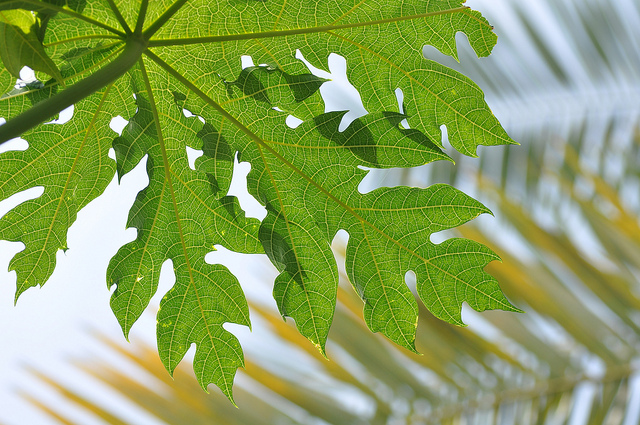
The primary use of papaya leaf (and papaya seeds) in herbal medicine today is as a vermifuge, that is, to remove intestinal worms. Papaya leaf has less of the protein-dissolving papain than the fruit, so it is less likely to "dissolve" the worms, but it contains tannins that the fruit does not.
These tannins protect the intestine from reinfection by "tanning" proteins in the lining of the intestinal wall so that worms cannot attach themselves.
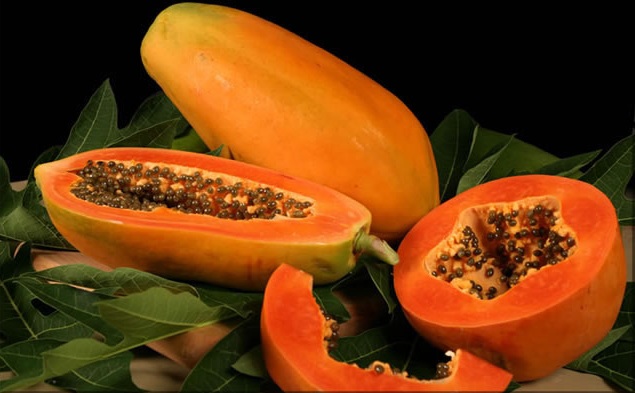
Papaya seeds seems to have some awesome properties, so far as eliminationing intestinal worms, cleasning the liver, and others. They have been used in ancient Chinese medecine, but my research tells me you have to know what you are doing, since some studies on animals "suggest" extended use can lead to infertility in men and miscarriages in women. Which make sense, because papaya seeds have traditionally been used as a contraceptive. But I won't let that scare me with such a powerful healing fruit and it's seeds. The health and healing properties of the seeds seem too powerful for me not to address how to take advantage of them, so until I understand more, I will take them occasionally, like once or twice every couple of months, to cleanse the liver and digestive track. Since the seeds have been eaten for centuries in foods, I'm pretty comfortable with the time tested human use of the papaya seeds seeds.
According to "Papaya the Medicine Tree," the entire papaya plant — roots, leaves and fruit — offers medicinal value. Young papaya leaves are eaten like a vegetable in some cuisines, and papaya leaf tea has a variety of purported medicinal effects.

Papaya leaf tea might prove effective as a cancer preventative and treatment, according to a study published in the February 2010 issue of the "Journal of Ethnopharmacology." In the tissue culture study, papaya leaf tea reduced inflammation and activated immune system toxic effects toward cancer cells, inhibited tumor cell growth and stimulated genes that modulate the immune system's anti-tumor effects. The researchers concluded that the results of their preliminary study indicate the immune-modulating properties of papaya leaf tea may prove to useful in treatment and prevention of diseases, including cancer, allergies and as a component in some vaccines.

Papaya leaf tea protected against gastric ulcer in a study on laboratory animals published in the September 2008 issue of the "West Indian Medical Journal." In the study, papaya leaf extract reduced ulcer severity and showed strong antioxidant effects. Papaya leaf extract also decreased oxidized lipids and increased antioxidant activity within red blood cells. Researchers concluded from this preliminary study that papaya leaf tea shows potential for the treatment of gastric ulcer and oxidative stress on the stomach.
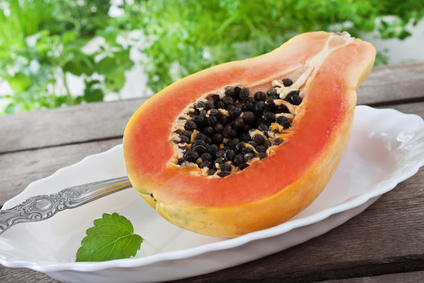
The enzyme papain in papaya leaves assists in the digestion of proteins and is useful for treating gastrointestinal disorders, according to the book "The Complete Herbal Guide: A Natural Approach to Healing the Body." Papaya leaf tea can alleviate heartburn discomfort and is an appetite stimulant. Papaya leaf tea may also help digest the wheat protein gluten, which is difficult for some people to digest and causes an autoimmune condition known as celiac disease.
I have no known allergic reactions to any food, but I always take my time when trying something new just to be sure. I read that excessive use of the herb can result in a very strong laxative effect. Also, the enzyme papain in papaya leaf has been known to cause allergic reactions in some people, according to a study published in the September 2008 issue of the journal "Ugeskrift for Laeger."
WARNING ABOUT HAWAIIAN PAPAYA – More than one third to half of Hawaiian papayas have been genetically engineered to withstand the papaya ringspot virus, so take purchasing precautions while shopping if you are concerned about GMO foods, like I am. Unfortunately, there seems to be some accidental "cross-pollination" on organic Hawaiian papaya farms, so I will avoid Hawaiian papaya totally as a precaution. Luckily, the Whole Foods I shop at is not selling the Hawaiian papaya, it is from Belize or Guatemala. They are not certified organic, so I don't know if they are sprayed or not, but better that than GMO.
A good article on how papain, the enzyme of unripe papayas, works amd can be utilized, can be found here.
 Papaya-Orange Drink Simple Recipe
Papaya-Orange Drink Simple Recipe
-3 cups fresh squeezed orange juice, chilled
-1 ripe papaya, peeled, seeded, and cut into chunks
-2 tablespoons lime juice
-1 1/4 cups seltzer water or carbonated water, (serious health food junkies omit the sparkling waters to keep any drink recipes 100% natural)
Optional Pink Himalayan Salt (With sweet fruity summer drinks, I love to coat the rum of my glass with pink Himalayan salt, similar to what you would do with a Margarita. It gives such a good balance to the sweet taste of fruit drinks)
Directions
1. Combine the orange juice and papaya in a blender in batches and puree.
2. Combine the orange-papaya puree with the lime juice and seltzer.
Add Pink Himalayan Salt to rim of glass if desired (Avoid common table Salt !!!!)
~stay healthy~
Goji Berries, an awesome superfood>>>>>>
<<< Gac, the unheard of Superfood
<<<Maca, the superfood that's a superfriend to everyone over 40
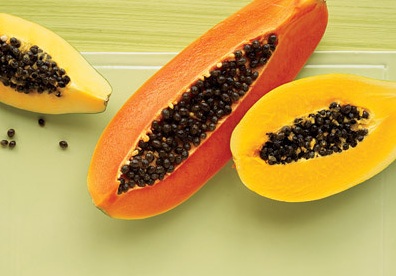
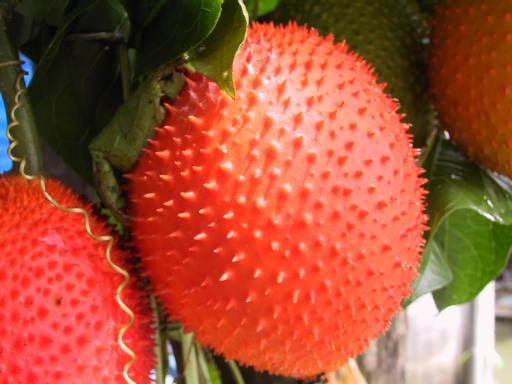
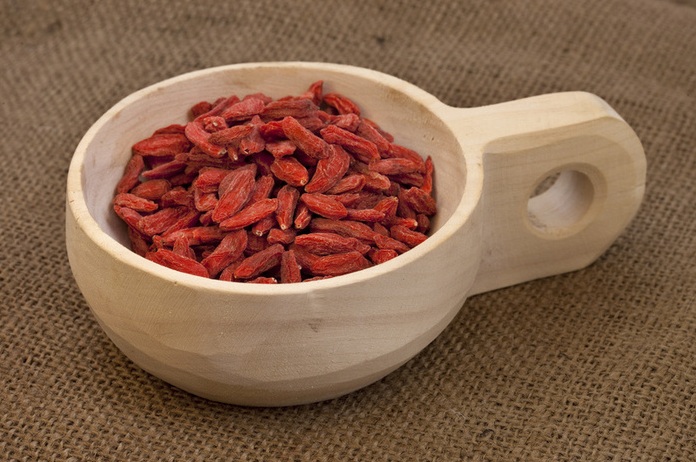
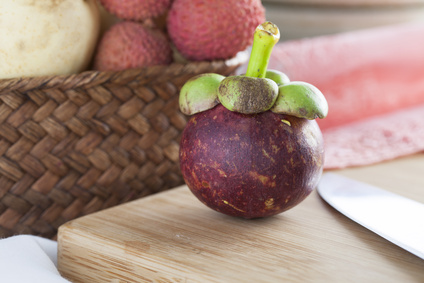
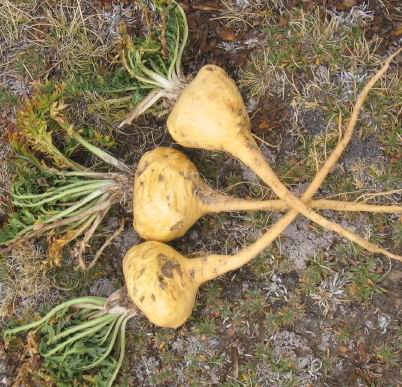



























































































10 Responses
Never knew that about the Papaya leaves. Interesting! Will have to try it out. Can you blend up the leaves and put in the drink as well?
I would have to ask a friend of mine who is an herbalist. I’m just starting out with the papaya enzyme capsules. The problem is you would probably have to deal with the papaya leaves in capsules because you won’t find them elsewhere. I do know that papaya leave have been used to tenderize meat. That’s why you see the Polynesians wrapping the meat in Papaya leaves before they slow cook their meat in the ground.
Thanks for your comment about GM papaya. When I see them at the store I'm never sure if I should get them or not so I pass. Are only Hawaiian papayas genetically modified? Would papaya from Mexico be okay, then?
Thanks!
I think the Mexican version are OK, at least I am confident enough because those are the ones I am buying now.
Where can I get papaya leaves in the Bay Area ?
It's very important, please let me know.
thanks.
If I were you, I would just order them off the web, it might be a problem finding them locally in they are native to warmer climates. Here is a link http://www.starwest-botanicals.com/product/1-papaya-leaf-cs-organic.html?utm_source=froogle&utm_medium=feed&gclid=CK_U_ICukbMCFY6DQgodG1UAkA
Protein content of papaya leaf is low when compared to papaya fruit, but what amount of protein is present in papaya leaf.
please let me know
You know to be honest with you I don’t know the answer to that question. Although I use the papaya fruit extensively, I haven’t done much with the leaf yet. Sorry, you might have to dig in and find out, and make sure you let me know because I’m curious as well
plz am eager to know cos I have a farm of pigs and am always feeding them with unripe pawpaw ,those it have any dangerous effects on them
hi ifedigbo gabriel chukwunonso,
I can’t say I’m qualified to answer, only possibly direct you to any relevant information on Papaya that I ran across in my research. One thing I have run across is that Papaya seeds causes sterility/infertility in males, if I’m correct, when taken in large quantities. I also I ran across that Papaya Seeds were also used as a fertility tool and abortion mechanism in women historically, but I’m not sure to what degree. I do know that papaya seeds in small quantities helps with several types of ailments like intestinal parasites, so the seeds have value, but perhaps precautions as well. I suppose there are cautions about taking too much, as there are with many things, though I don’t know what that “too much” would be, for men or animals.
sorry I can’t be of more help but make sure you do further research on Papaya Seeds and fertility/sterility
Doug at Gaia Health Blog